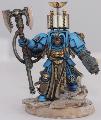| Author |
Message |
 |
|
|
 |
|
Advert
|
Forum adverts like this one are shown to any user who is not logged in. Join us by filling out a tiny 3 field form and you will get your own, free, dakka user account which gives a good range of benefits to you:
- No adverts like this in the forums anymore.
- Times and dates in your local timezone.
- Full tracking of what you have read so you can skip to your first unread post, easily see what has changed since you last logged in, and easily see what is new at a glance.
- Email notifications for threads you want to watch closely.
- Being a part of the oldest wargaming community on the net.
If you are already a member then feel free to login now. |
|
 |
![[Post New]](/s/i/i.gif) 2015/01/25 12:37:59
Subject: Statistics- Do They Matter?
|
 |

Devestating Grey Knight Dreadknight
|
Mathhammer is very important for tournies and if you really want a chance at winning.
Like everyone else has said, smaller amounts of dice rolled means the total average has a pretty good chance of deviating; so it becomes slightly more luck.
Always play the odds. My heart says a squad of terminators will beat a mob of Sluggas, but the head knows its more likely to be the other way... and more cost efficent.
|
 SHUPPET wrote: SHUPPET wrote:
wtf is this buddhist monk ascendant martial dice arts crap lol
|
|
|
 |
 |
![[Post New]](/s/i/i.gif) 2015/01/25 12:48:38
Subject: Re:Statistics- Do They Matter?
|
 |

Hurr! Ogryn Bone 'Ead!
|
Whenever anyone makes any decision about whether a unit will damage an enemy, or survive an attack, they are instinctively mathammering. If someone's mathammering was confounded during the game by luck, and this makes them think that mathammering is pointless, they're either don't know how to do maths, or don't know how stats work.
|
 Death Korps of Krieg Siege Army 1500 Death Korps of Krieg Siege Army 1500 |
|
|
 |
 |
![[Post New]](/s/i/i.gif) 2015/01/25 14:24:48
Subject: Statistics- Do They Matter?
|
 |

Agile Revenant Titan
|
 Verviedi wrote: Verviedi wrote:I like calculating, and base my unit choices on statistical damage output.
Some people I know say "This is a game of luck, stats don't matter. Walkrants are WAY better."
This brings up a point. Do statistics matter in game? Discuss.
If you want to win, then yes. Without statistics, theres no telling what units are good.
|
I do drugs.
Mostly Plastic Crack, but I do dabble in Cardboard Cocaine. |
|
|
 |
 |
![[Post New]](/s/i/i.gif) 2015/01/25 20:49:28
Subject: Statistics- Do They Matter?
|
 |

Longtime Dakkanaut
|
Don't rely on averages; Apply overwhelming force.
Contingency plan:
a) Sometimes the overwhelming force isn't enough so make sure your don't leave yourself in a vulnerable position.
b) Often overwhelming force is in excess of requirements; position yourself so you can go after secondary objectives/enemies if the first target is dealt with more easily than you expected.
In short mitigate bad luck's opportunity and leverage your opportunity to have good luck.
|
|
This message was edited 1 time. Last update was at 2015/01/25 20:49:40
|
|
|
 |
 |
![[Post New]](/s/i/i.gif) 2015/01/25 21:08:47
Subject: Re:Statistics- Do They Matter?
|
 |

Veteran Wolf Guard Squad Leader
|
Yes they absolutely matter. Of course you can roll lucky ( eg . it is possible for a single gretchin shooting can kill a terminator). But repeat 10000 times and the law fo averages will show - the terminator will survive 97.25% of the time...or therabouts.
|
I let the dogs out |
|
|
 |
 |
![[Post New]](/s/i/i.gif) 2015/01/26 04:53:00
Subject: Statistics- Do They Matter?
|
 |

The Hammer of Witches
A new day, a new time zone.
|
 Quickjager wrote: Quickjager wrote:Mathhammer is very important for tournies and if you really want a chance at winning.
Like everyone else has said, smaller amounts of dice rolled means the total average has a pretty good chance of deviating; so it becomes slightly more luck.
A single dice roll is always a single event, so all possible results in the spread are equally likely. It's just as possible to roll nothing but 6s as nothing but 1s. You can't stop bad luck, but you minimize it when you make choices like, 'am I likely to kill more guys if I shot them with a few shots that ignore armor, or a lot of shots that don't?'
|
"-Nonsense, the Inquisitor and his retinue are our hounoured guests, of course we should invite them to celebrate Four-armed Emperor-day with us..."
Thought for the Day - Never use the powerfist hand to wipe. |
|
|
 |
 |
![[Post New]](/s/i/i.gif) 2015/01/26 07:40:36
Subject: Statistics- Do They Matter?
|
 |

Grizzled Space Wolves Great Wolf
|
blaktoof wrote:statistics matter sometimes. Statistics, means, averages, etc only really come out[are reliable as a method of planning] when there is a very large number of dice being used. This means it is more important if you see someone rolling 60 shots to hit from an unit, than if you see someone rolling 2 shots to hit from an unit. The chance for something to deviate from statistical average becomes lower the more times it is repeated, this is how casinos win and you lose. The more you play the more likely the casino gets your money because you are more likely to keep within the bounds of standard deviation at large numbers. So for armies that use large pools of dice for things, this is important. For other armies, you cannot count on it as much. This is compounded by the fact that your statistical math hammer unit is not going to be doing what you are calculating every turn of every game. Chances are you wont be firing your unit every turn, or assaulting every turn, etc. This further moves the dice pool from rolling a lot of dice to a few dice. for example. 30 shoota boyz, shooting things. Fire 60 dice a round they shoot. If a Game lasts 6 turns [total of 360 shots] and they fire every turn you are more likely to generate a number close to the statistical average of BS 2 (33% chance to hit) than a squad of tankbustas that has 5 models firing two times in a game which although they have BS2 since rolling is random there is a much more likely chance to roll above or below the statistical average due to the small dice pool, ie it is reasonably possible to roll 3/5, or 4/5 hits instead of 2/5. The basic reasoning behind this is it is very possible to roll a 6 on 1 die. It is less possible to roll 2 6's on 2 die, and on and on. The chance of rolling high or well for what you need is the same, but the chance to have a large number of high rolls is lower the more dice you roll. In effect the results of rolling dice is a curve with outlier possibilities above average and below average. The variances becomes smaller the larger the pool becomes because the chance to have a statistical % change in a random set of numbers becomes lower with more dice, ie its harder to roll a yahtzee than a single 6 on a d6. The result is you are going to see more variance in dice rolls with small dice pools than large dice pools.
This is not entirely true. You approach the statistical average when you have a large number of trials AND the statistical average rises. If you have 500 attacks but the average is only 10, you're unlikely to approach the average. In fact you're less likely to approach the average than someone who only has 20 attacks but still has an average of 10. In practice it can quite often be the opposite of what you're saying. Say you have 2 Terminators you want to kill, so you attack it with, I dunno, lets say something with 6 attacks that has a 33% chance of killing with each attack... that means the average is 2 kills so on average the Terminators die. Alternatively, you attack the 2 Terminators with 60 attacks from something that only has a 3.3% chance of killing. The average is also that 2 Terminators die. Even though both have the same statistical average... it may (or may not) surprise you to find out that the 6 attacks with 33% chance per attack is more likely to succeed than the 60 attacks with 3.3% per attack. The former has a 65% chance of killing both terminators, the latter only has a 60% chance. This is because as you increase the number of trials, the variance actually INCREASES, this is logical because as you have more trials, the more possible outcomes so the results have to be spread wider. So what that means in practical terms is you're most likely to approach the average if you have one horde army fighting another horde army (lots of dice, reasonably high chance of success, lots of models being removed), a horde army fighting an elite army will actually tend to vary from the average the most (lots of dice, but a low chance of success on each one, only a few models are being removed). An elite army which only rolls a small number of dice but the chance of success is higher will tend to lie somewhere in the middle as far as how much you can rely on getting the average.
|
|
This message was edited 2 times. Last update was at 2015/01/26 07:43:43
|
|
|
 |
 |
|
|